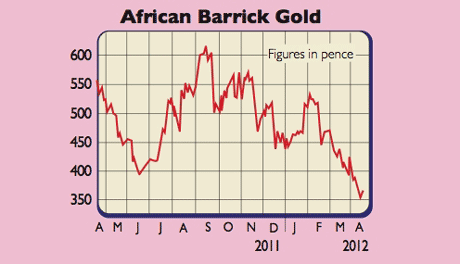Get the latest financial news, insights and expert analysis from our award-winning MoneyWeek team, to help you understand what really matters when it comes to your finances.
You are now subscribed
Your newsletter sign-up was successful
Want to add more newsletters?

Twice daily
MoneyWeek
Get the latest financial news, insights and expert analysis from our award-winning MoneyWeek team, to help you understand what really matters when it comes to your finances.

Four times a week
Look After My Bills
Sign up to our free money-saving newsletter, filled with the latest news and expert advice to help you find the best tips and deals for managing your bills. Start saving today!
African Barrick Gold is Tanzania's largest gold producer and one of the five majors in Africa. It owns four production facilities and has 31 million troy ounces of known reserves, equivalent to 45 times last year's production. The board aims to increase output 45% to one million oz by 2014 from 688,000 oz today. Assuming the gold price remains at $1,700, this should generate cash profits of about $800m per year. That's a good return on a beaten-up market capitalisation of $2.5bn.
So why the low rating? A gold price crash is possible, but I think it's unlikely, due to extra liquidity from quantitative easing and ultra-lax monetary policies across the world. This inflationary backdrop, combined with investors looking for safe havens, declining gold supplies and central bank buying, should support the price in the medium term.
Another overblown concern is geopolitical risk. Tanzania has been put in the same category as other riskier frontier markets where asset seizures are a real worry. Last month, shares in Randgold Resources were hammered after a military coup in Mali threatened some of its assets. But Tanzania has an established legal framework and relative political stability.
MoneyWeek
Subscribe to MoneyWeek today and get your first six magazine issues absolutely FREE

Sign up to Money Morning
Don't miss the latest investment and personal finances news, market analysis, plus money-saving tips with our free twice-daily newsletter
Don't miss the latest investment and personal finances news, market analysis, plus money-saving tips with our free twice-daily newsletter
The Tanzanian authorities are increasing their tax on mining activities. Royalties could soon rise by 1% ($17m per year) to 4%. Yet this is no different to Britain's raid on North Sea oil in 2011. A further concern is the rising cost of salaries for skilled staff, but African Barrick Gold is doubling efforts to train local workers and reduce its dependence on expensive expatriates.
African Barrick Gold (LSE: ABG), ratedOUTPERFORMby RBC Capital

The group is also being hit by power rationing after a drought in east Africa caused disruptionsto electricity supplies. Last December, it began installing back-up diesel generators, which should beatall of its sites by the end of June. It is also exposed to foreign-exchange markets and security breaches.
Despite these risks, and given the support from its majority shareholder Barrick Gold Corporation (with a 74% stake), I value the group on six-times earnings before interest, tax, depreciation and amortisation (EBITDA). Adjusting for $584m of net cash and $158m in decommissioning costs delivers a fair value of more than 550p a share.
RBC has a price target of 600p.
Rating: HIGHER-RISK BUY at 370p
Paul Hill also writes a weekly share-tipping newsletter, Precision Guided Investments. See www.moneyweek.com/PGI , or phone 020- 7633 3634 for more details.
Get the latest financial news, insights and expert analysis from our award-winning MoneyWeek team, to help you understand what really matters when it comes to your finances.
Paul gained a degree in electrical engineering and went on to qualify as a chartered management accountant. He has extensive corporate finance and investment experience and is a member of the Securities Institute.
Over the past 16 years Paul has held top-level financial management and M&A roles for blue-chip companies such as O2, GKN and Unilever. He is now director of his own capital investment and consultancy firm, PMH Capital Limited.
Paul is an expert at analysing companies in new, fast-growing markets, and is an extremely shrewd stock-picker.
-
 Should you buy an active ETF?
Should you buy an active ETF?ETFs are often mischaracterised as passive products, but they can be a convenient way to add active management to your portfolio
-
 Power up your pension before 5 April – easy ways to save before the tax year end
Power up your pension before 5 April – easy ways to save before the tax year endWith the end of the tax year looming, pension savers currently have a window to review and maximise what’s going into their retirement funds – we look at how